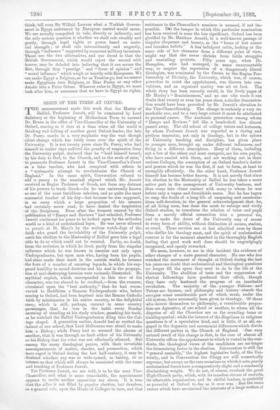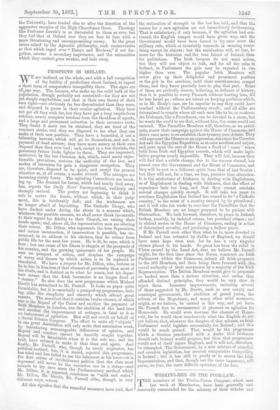SIGNS OF THE TIMES AT OXFORD.
THE-announcement made this week that the Master of Balliol, Professor Jewett, will be nominated by Lord .Salisbury at the beginning of Michaelmas Term to succeed Dr. Evans in the office of Vice-Chancellor of the University of Oxford, coming as it does at a time when all the world is thinking and talking of another great Oxford leader, the late Dr. Pusey, marks in a very emphatic way the vast though , silent change which has lately come over the spirit of the University. It is not twenty years since Dr. Pusey, who had himself in earlier days suffered the penalty of suspension from the University pulpit, declared that he " held himself bound, by his duty to God, to the Church, and to the souls of men,- to prosecute Professor Jowett in the Vice-Chancellor's Court as a false teacher, who had conspired with others in a " systematic attempt to revolutionise the Church of Etgland." In the same spirit, Convocation refused to add a penny to the nominal stipend which Mr. Jowett received as Regius Professor of Greek, not from any distrust of his powers to teach Greek—for he was universally known as one of the most fastidious scholars, and as quite the most nueoeasful teacher of his day—but because he was supposed, in an essay which a large proportion of his censors had certainly never read, to have denied the inspiration of the Scriptures. Even after the ferment caused by the publication of "Essays and Reviews had subsided, Professor 'Jewett continued for years to be looked upon by the orthodox world as a kind of ecclesiastical leper. He was never allowed to preach at St. Mary's by the zealous watch-dogs of the faith who guard the inviolability of the University pulpit, until his election to the Mastership of Balliol gave him a legal title to do so which could not be resisted. Partly, no doubt, from the seclusion in which he lived, partly from the singular influence which he was known to exercise not only upon 'Undergraduates, but upon men who, having been his pupils, had since made their mark in the outside world, he became 'the hero of a number of amusing legends, in which his sup- 'posed hostility to sound doctrine and his zeal is the propaga- tion of soul-destroying heresies were variously illustrated. No mythical exploit, which corresponded to this view of his character, was too absurd to be credited,—from the rumour, circulated upon the "best authority," that he had recon- yerted to Buddhism a Siamese Undergraduate who, before coming to Oxford, had been baptised into the Roman Catholic faith by missionaries in his native country, to the delightful story, which is still, perhaps, current in some country parsonages, that he was in the habit every Sunday morning of standing at his study window, gnashing his teeth, as he watched the Balliol Undergraduates filing into the Col- lege chapel. A generation earlier, Arnold had so excited the hatred of one school, that Lord Melbourne was afraid to make him a Bishop ; while Pusey had so aroused the alarms of 'another, that it was through no fault either of hi a University or his Bishop that his voice was not effectually silenced. But
• among the many theological panics, with their invariable • a000napaniments of malice, slander, and persecution, which have raged in Oxford during the last half-century, it may be doubted whether any was so wide-spread, so lasting, or so ititenee as that which will always be associated with the name and teaching of Professor Jowett.
Yet Professor Jewett, we are told, is to be the next Vice- Chancellor, and what is more remarkable, the appointment appears to excite neither opposition nor alarm. It is true that the office is not filled by popular election, but devolves, as a general rule, upon the Heads of Colleges in turn, and that resistance to the Chancellor's nominee is unusual, if not im- possible. Bt the temper in which this particular nomination has been received is none the less significant. Oxford has been glorified by Mr. Matthew Arnold, in a well-known passage of singular eloquence and beauty, as the "home of lost causes and forsaken beliefs," A less indulgent critic, looking at the same side of her character from a different point of view, might say that she never shrinks from futile struggles and unavailing protests. Fifty years ago, when Dr. Hampden, who had managed, in some unaccountable way, to acquire the reputation of a dangerously liberal theologian, was nominated by the Crown to the Regius Pro. feesorship of Divinity, the University, which was, of course, powerless to resist the appointment, was thrown into con- vulsions, and an organised mutiny was set on foot. The whole story has been recently retold, in the lively pages of Mr Mozley's "Reminiscences," and no one who reads it can doubt that twenty or even ten years since, a similar demonstra- tion would have been provoked by Mr. Jowett's elevation to the Vice-Chancellorship. The change is certainly a very re- markable one, and to a very large extent it must be attributed to personal causes. The academic generation among whom "Essays and Reviews" fell like a bomb-shell has almost passed away. The old school of college tutors and lecturers, by whom Professor Jewett was regarded as a daring and perilous innovator, not only in theology, but in the sphere of University teaching and discipline, has given place to younger men, brought up under different influences, and living in a different atmosphere. Many of them, including not a few of the ablest and most energetic, are his own pupils, who have carried with them, and are working out in their various Colleges, the conception of an Oxford teacher's duties and powers which he was the first, if not to form, at least to exemplify effectively. On the other hand, Professor Jowett himself has become better known. It is not merely that since his election to the Mastership of Balliol he has taken a more active part in the management of University business, and thus come into closer contact with many to whom he was before only a vague and formidable name. But he has begun to reap the fruits of a long life of unsparing and unostenta- tious self-devotion, in the general acknowledgment that he, of all living men, has done the most to enlarge and vivify Oxford studies, to transform the relation of tutor and pupil from a merely official connection into a personal tie, and to make the doors of the University easy of access to every form of ability, without distinction of means, station, or creed. These services are at last admitted evert by those who dislike his theology most, and the spirit of ecclesiastical rancour is for the moment absorbed in the thoroughly English feeling that good work well done should be ungrudgingly recognised, and openly rewarded. We seem, however, to see in this incident the evidence of other changes of a more general character. No one who has watched the movement of thought at Oxford during the last ten years can doubt that ecclesiastical and theological questions no longer fill the space they used to do in the Life of the University. The abolition of tests and the suppression of clerical fellowships have produced their effect, though they have only hastened the progress of an inevitable revolution. The majority of the younger Fellows and Tutors are laymen, and philosophy and history absorb the energies some considerable part of which must, under the old system, have necessarily been given to theology. Of those who' devote themselves to philosophy, a considerable propor- tion are Agnostics, of one school or another, to whom all the disputes of all the Churches are as the sounding brass or tinkling cymbal ; while the interest of the Hegelians in religious questions is of a speculative kind, and is little, if at all, en- gaged in the dogmatic and ceremonial differences which divide , the different parties in the Church of England. One very natural result of this change is that, in the case of almost all University offices the appointment to which is vested in the resi- dents, the theological views of the candidates are is longer the determining factor in the election. Convocation Is still the "general assembly," the highest legislative body, of the Uni- versity, and in Convocation the Clergy are still numerically supreme; but except on the rare occasions on which it acts, purely ecclesiastical forces have a comparatively slight and a constantly diminishing weight. We do not, of course, overlook the great High-Church party, which, with its ceaseless stream of recruits, its admirable organisation, and its skilful leaders, is probably as powerful at Oxford to-day as it ever was. Bat the same causes which have secularised the interests of a large section of the University, have tended also to alter the direction of the aggressive energies of the High Churchmen there. Theology like Professor Jowett's is as distasteful to them as ever, but they feel that at Oxford now they are face to face with a more threatening and uncompromising enemy. In the great issues raised by the Agnostic philosophy, such controversies as that which raged over " Essays and Reviews," if not for- gotten, assume a secondary importance, and the animosities which they excited grow weaker, and fade away.



































 Previous page
Previous page